Stories from Our Community of Practice
The diverse and fascinating work of the faith and health movement is usually driven out of the passion and commitment of those doing the work. We want to capture the experience and wisdom that lies underneath the work so that we can all learn from it and continue to be inspired.
Submit your story here!
If you have a story to share, send us your name and contact information and a brief description of what you want to share and we will follow up with you to get the details.
STORIES
Gratitude Jar Project Makes an Impact One Blessing at a Time
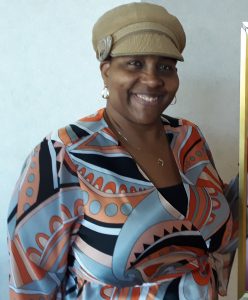
Floretta Strong-Pulley
Despite facing healthcare challenges and living through a pandemic, Floretta Strong-Pulley greets each day with gratitude. “I’m so thankful to be alive,” she said. “Life is precious – I don’t want to waste a moment of it.”
To help her along her gratitude journey, Floretta, who has diabetes and undergoes maintenance chemotherapy, has joined dozens of others in participating in the Gratitude Jar Project.
The project began in January 2020 through the Partners of Faith Health Network (PFHN) at Advocate Trinity Hospital and Advocate South Suburban Hospital.
Participants reflect on the things for which they are grateful. It could be an experience, a loved one or a co-worker they appreciate. They write down the blessing and place the note in their jar.
At the end of the year, participants will gather to share their gratitude messages and how being grateful has made a positive impact on them.
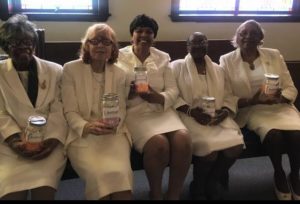
PFHN members, like Eva Harris, have shared the Gratitude Jar project with their congregations. Here you can see the usher board of Blackwell-Israel Samuel AME Zion Church, Chicago, showing off their jars.
“The goal of the project was to start the new year with a focus on gratitude and to encourage members of the PFHN to stay mindful of the blessings they have in their lives,” said Patricia Jackson, a community health worker with Trinity who coordinates the PFHN program. “It’s a way to see the positive things in life. We can always look at the jar and see all that we can be thankful for.”
“Positive thoughts can generate more positive thoughts,” said Gloria Brown, chaplain at Advocate Trinity Hospital. “We all go through hard times. The gratitude jars can provide encouragement when life can be difficult.”
“We do know that joy promotes good health,” she added. “We look forward to seeing how participants’ health improves this year.”
Floretta took the Gratitude Jar project one step further and created a Gratitude Bucket List. She writes down her blessings and goals on clothes pins and attaches them to a blue oval container. When she achieves a goal, she drops the clothes pin in the bucket.

Among some of Floretta’s goals: Having a “Pamper Party.”
Her goals include exercising, completing a family photo history project, losing weight, walking in the park, working around the house, having a game day and more.
“I’m having a ball,” Floretta said. “The project has helped me focus on my goals and remind me of my blessings.”
“Having a positive attitude can impact the disease they have,” Jackson said. “A happy attitude can impact how they handle a situation. Every day they can look at the jar. They can put something in it for which they are thankful. It makes them feel happy.”
Putting on Their Oxygen Masks
Faith Leaders Take Time to Help Themselves to Better Help Others
As the COVID-19 pandemic continues to take hold across our nation, faith leaders have become overwhelmed by the increased demands of caring for their community during this crisis, they say. Oftentimes, caring for themselves takes a back seat to meeting the needs of those whom they serve.
Recognizing this, staff from Advocate Aurora Health Faith and Health Partnerships and Hartgrove Behavioral Health collaborated to create a six-week virtual support group for faith leaders. The first series took place this past summer.
“Faith leaders are on the frontline, supporting their communities,” said Amy McNicholas, faith and mental health specialist for Advocate Aurora Health. “The goal of the support group is to give clergy, chaplains, youth group workers and other faith leaders a safe space to connect, share and take a collective breath.”
During the summer session, participants discussed a wide range of topics, including vulnerability – how it is not a weakness but a power. “That resonated with the group,” McNicholas said. “It gave them the permission to feel that it was okay to not be okay.”
Many shared the loss they and their faith communities had experienced due to the pandemic. “We talked about the trauma and grief everyone was experiencing,” McNicholas said.
“The series helped us become more trauma informed,” said Darryl Jenkins, pastor of Faith Community Church, Itasca, IL. “We learned more about how to provide trauma-informed care to benefit our congregations and communities at large.”
“I found concrete help in dealing with my own patterns of responding to trauma, which were increasing my anxiety during the pandemic,” another participant said. “Particularly, the learning around Adverse Childhood Experiences was so insightful and helped me unpack the way I and those closest to me responded to the pandemic. I also appreciated the steps to build more resiliency through self-awareness and self-care.”
Faith leaders also discussed the logistical challenges of serving during the COVID-19 pandemic.
“Many clergy didn’t have the resources or technology needed to keep their congregations connected during the pandemic,” Pastor Jenkins said. “We shared ways we can do some things differently – to delegate and use new technology. We relied on one another for resources. That was invaluable.”
“It was helpful and beneficial to be able to flesh out our concerns and challenges and to share in learning,” Pastor Jenkins said. “But it was especially beneficial to me to know Advocate Aurora Health was engaged with us through this support group. It was helpful to know that Advocate Aurora valued us, and that our voices were being heard by staff who were sincerely interested in what they could do to strengthen faith leaders.”
Giving Back Full Circle
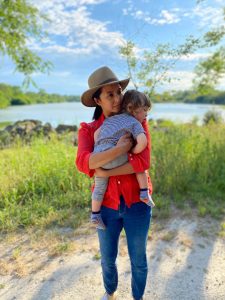 To show her gratitude and say thank you for the support she, her husband, Nicholas, and son, Reid, have received over the past year, Marita is giving back.
To show her gratitude and say thank you for the support she, her husband, Nicholas, and son, Reid, have received over the past year, Marita is giving back.
She has donated clothing and other baby items for families impacted by the COVID-19 pandemic and has created care packages of toiletries and socks for those facing homelessness.
Since the COVID-19 pandemic began, Ivette Menendez, Community Connector with Advocate Health Care, and Nilda Garcia, Faith Community Nurse with Advocate, have been overwhelmed by the generosity and love shown by residents, like Marita.
“We are seeing acts of love by people who are full of love who want to support others,” Ivette said. “The pandemic is bringing people together.”
When the pandemic hit, Nicholas’ work as a photographer came to a halt.
The family received help through the Avondale Faith and Health Collaborative, through which Nilda and Ivette serve, by receiving diapers and rent and utilities assistance.
Marita received support through the Collaborative before the pandemic, as well
Marita attended Nilda’s infant massage class and other programs designed to nurture new mothers and families.
“I wasn’t’ prepared for that fourth trimester, the first three months of becoming a new mother,” Marita said. “Nilda’s classes allowed me to connect with other mothers and helped me feel like I wasn’t alone.”
“Nilda’s classes were my sanctuary,” Marita added. “Nilda has given me confidence in being a new mom. She has been a pillar of support.”
“All I want to do now is to give back full circle – to support Nilda the same way she has supported us. I have my sisters, my mother and my mother-in-law. But Nilda has kept me going, for sure.”
Avondale Faith and Health Collaborative
Marita’s donations of baby items and her involvement with a homelessness ministry help strengthen the work of the Avondale Faith and Health Collaborative, under which Nilda and Ivette serve.
The Collaborative is a partnership of faith-rooted organizations and faith communities that have come together to improve the health and well-being of Avondale residents.
Nilda and Ivette’s work also includes developing and supporting congregational health ministries, developing and coordinating health promotion programs and consulting with residents and faith leaders on health questions and issues.
Learn more about the work of Nilda and Ivette by visiting their Instagram page: love_in_avondale.
Love is Alive in Avondale – and Beyond
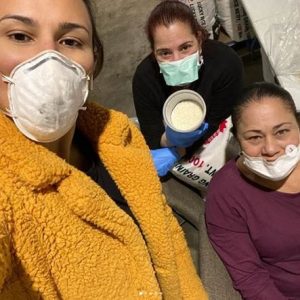 Ivette Menendez and Nilda Garcia have seen firsthand how acts of love can transform a community.
Ivette Menendez and Nilda Garcia have seen firsthand how acts of love can transform a community.
Since the COVID-19 pandemic began, Ivette, Community Connector with Advocate Health Care, and Nilda, Faith Community Nurse with Advocate, have been overwhelmed by the generosity and love shown by residents of Avondale, Logan Square, Humboldt Park, Belmont Cragin and other nearby communities in Chicago.
Donations of food, baby items, diapers, socks, clothing – and more – have helped those experiencing financial burden, food insecurity and other instabilities due to the pandemic.
Nilda says it has been inspiring to see the generosity shown by residents. “In Logan Square, people continue to show acts of love by designating donation boxes and placing them on their front porches,” she said. “This allows community members to drop off items to help those impacted by the pandemic.”
Volunteers have stepped up too.
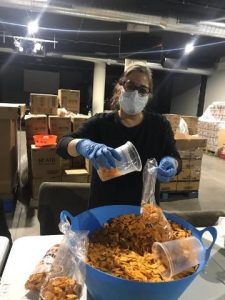 They assist Nilda and Ivette at the Loving Pantry, a pop-up food pantry established at Jehovah el Buen Pastor Evangelical Lutheran Church in Logan Square, in response to the pandemic.
They assist Nilda and Ivette at the Loving Pantry, a pop-up food pantry established at Jehovah el Buen Pastor Evangelical Lutheran Church in Logan Square, in response to the pandemic.
In addition to providing food, Nilda and Ivette help residents by securing donated diapers, baby items, clothing and other essentials, and referring them to area agencies for utility and rent assistance, spiritual and social-emotional resources and other services.
Residents who have received help are giving back.
Ivette recalls talking to a woman who had never considered volunteering before the pandemic. “She said, ‘But now that I see how people are being helped, I want to get involved,’” Ivette said. “People are coming out of their shells and are hopeful. They want to share love.
It’s so amazing to experience that.”
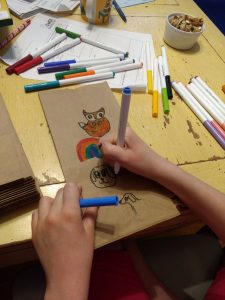 Nilda and Ivette admit their work can be overwhelming at times.
Nilda and Ivette admit their work can be overwhelming at times.
“As we help one family at a time, it makes me happy and it motivates me to do whatever I can for the next family,” Ivette said. “It can be overwhelming because we want to save the world. We couldn’t do it without our partners and volunteers.”
Even the youngest volunteers can make a difference, Nilda says. Children from the community recently got involved in the Community Dinners program, a meal program for those experiencing homelessness, by decorating bags for clients and filling them with socks, masks and toiletries.
“We are seeing acts of love by people who are full of love who want to support others,” Ivette said. “The pandemic is bringing people together.”
Avondale Faith and Health Collaborative
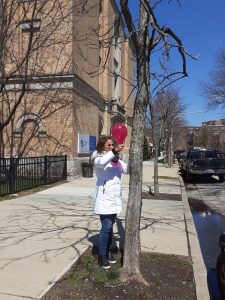 Ivette and Nilda serve through the Avondale Faith and Health Collaborative, a partnership of faith-rooted organizations and faith communities that have come together to improve the health and well-being of Avondale residents.
Ivette and Nilda serve through the Avondale Faith and Health Collaborative, a partnership of faith-rooted organizations and faith communities that have come together to improve the health and well-being of Avondale residents.
Community members and partners of the Avondale Faith and Health Collaborative established the Loving Pantry in response to the COVID-19 pandemic. The pantry and other efforts to help those impacted by COVID-19 align with the Collaborative’s goal of cultivating a loving and healthy community in which people can be healthy, safe and connected.
The Collaborative’s efforts also support Advocate Aurora Health’s community strategy, which includes prioritizing health equity and addressing social influencers of health, such as food security, housing and access to care.
Learn more about the work of Nilda, Ivette and the Avondale Faith and Health Collaborative by visiting their Instagram page: love_in_avondale.
National Health Corps Chicago Members Make Impact at Advocate Trinity Hospital
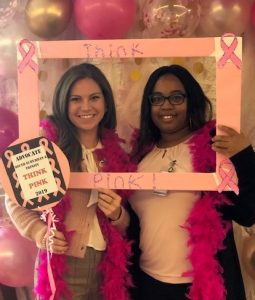 As she looks ahead, Christina Baum (left) hopes to attend medical school and become a physician at a women’s correctional facility.
As she looks ahead, Christina Baum (left) hopes to attend medical school and become a physician at a women’s correctional facility.
Caitlyn Asama (right) sees law school in her future, with the goal of practicing healthcare law.
Baum and Asama feel better prepared for their futures, they say, thanks to a partnership between Advocate Trinity Hospital and National Health Corps Chicago (NHC Chicago).
Through NHC Chicago, Christina serves as a diabetes educator for Trinity’s Diabetes Prevention Program, which uses Centers for Disease Control and Prevention curriculum.
Caitlyn serves as a health educator through Trinity’s Healthy Living Food Farmacy program.
They are among the 20 NHC Chicago members serving in 13 health-related organizations throughout Chicagoland for the 2019-20 term.
The partnership between Trinity and NHC Chicago began in 2010. Since then, NHC Chicago graduates have gone on to become doctors, nurses, public health specialists and other healthcare professionals.
“We appreciate having NHC Chicago members serve at our hospital each year, said Erika Davis, manager of community health at Trinity. “It’s a way for them to gain exposure to the healthcare field.”
Trinity also benefits, Davis said. “We get the extra help and support. NHC Chicago members bring innovative young minds to the table and provide different strategies, ideas and suggestions to support our programs.”
National Health Corps Chicago, a program of the National Health Corps AmeriCorps program, began in 1994 with the mission to improve access to health services in underserved communities.
“We are grateful for their hard work and dedication,” said Rukiyat Lawal, coordinator of community health at Trinity. “It shows they have a will and compassion to serve in underserved communities. They chose our hospital because they see the programs that we offer and how we are addressing socio-economic barriers to health and wellness.”
 Caitlyn Asama, health educator, Advocate Trinity Hospital Healthy Living Food Farmacy
Caitlyn Asama, health educator, Advocate Trinity Hospital Healthy Living Food Farmacy
Her work includes ordering and distributing food; leading brief exercise classes and checking participants’ weight, blood pressure and glucose levels.
“Working here has been eye-opening,” Asama said. “I never knew fruits and vegetables could be costly for so many people, especially for those who rely on Social Security. There is only so much they could afford.”
Caitlyn spends time with participants, sharing resources and information on nutrition and how eating better could help alleviate some of their chronic conditions. “I make it a point to sit down and talk with participants about their concerns,” Caitlyn said. “Some people just really need an ear. That’s been a great thing for me.”
A Highlight: When a participant shared how she had become more aware of the food choices she makes when grocery shopping.
“She now avoids foods with high sodium and sugar content,” Caitlyn said. “That was really great. It shows me that the program is working, and someone is getting some benefit out of it.”
 Christina Baum, Diabetes Educator, Advocate Trinity Hospital Diabetes Prevention Program
Christina Baum, Diabetes Educator, Advocate Trinity Hospital Diabetes Prevention Program
Her work includes recruiting participants, facilitating sessions on such topics as lifestyle, fitness and nutrition; tracking participants’ weight, physical activity and diet; providing health tips and encouraging participants as they work to lose their target weight.
“Awareness is a very big aspect of the diabetes prevention program,” Baum said. “A lot of people don’t know they are pre-diabetic or predisposed to having diabetes. A lot of what I do is getting the conversation started. It’s better to take preventive measures than address diabetes when it’s too late.”
“During the class, I hear the struggles participants are having,” Baum said. “I share resources that could help them along their journey, like how to eat healthy while on the go. We spend some time generating a list of healthy snacks that are still fast but a little bit better for them then fast food.”
A Highlight: seeing one of the participants achieve her weight-loss goal early in the program. “We were super excited about that,” she said. “When she learned what lifestyle changes worked for her, she just went all in. It was awesome to see.”
Veronica Kyle from Faith in Place
Veronica talks about her work in food justice and urban agriculture and the transformation of youth, congregations and herself through a project to build community gardens.



